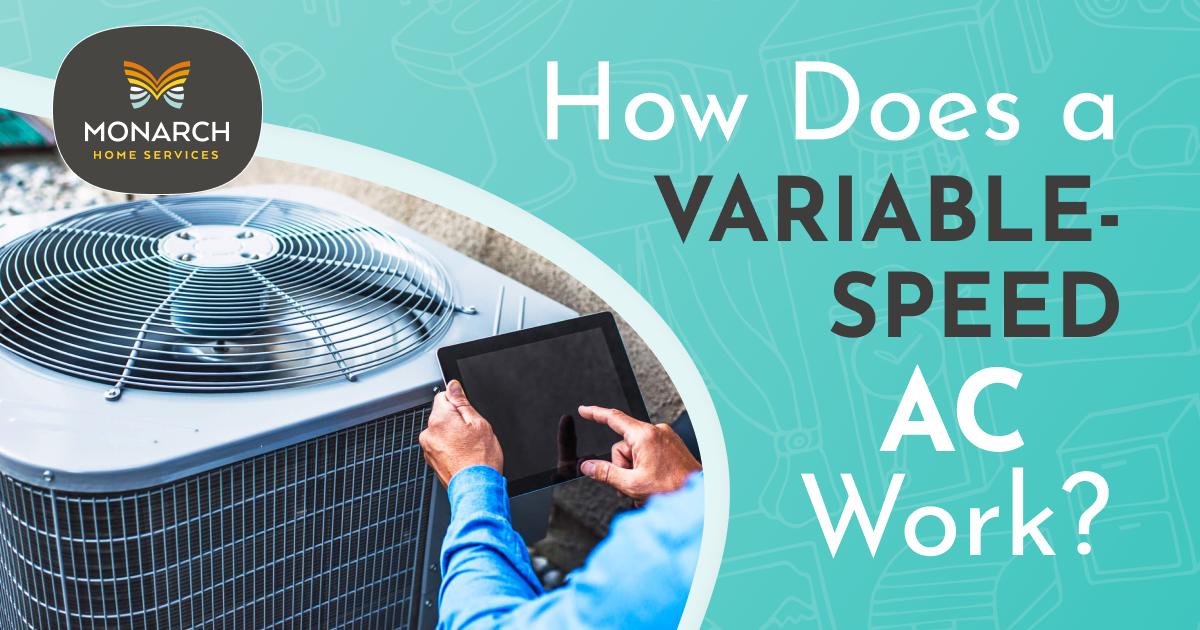
The variable speed motor was invented in 1888 by Nikolai Tesla. But the first inverter-driven compressor for a residential split-type air conditioner wasn’t developed until 1981. Nonetheless, less efficient single-stage compressors remained standard. Variable-speed compressors have become more widely available in recent years and represent a more reliable, precise, and efficient solution. We’ll now explain the workings of a variable-speed AC and how it differs from other technologies.
How a Single-Stage Compressor Works
An air conditioner with a single-stage compressor will only turn on or off. The system activates when the actual indoor temperature exceeds the setting on the thermostat. And when your home’s air returns to the set temperature, the thermostat will signal the AC to shut off until it’s needed again. The unit functions at 100% capacity whenever it turns on.
How a Two-Stage Compressor Works
When you look at single-stage and variable-speed compressors, a two-stage compressor is sort of the middle ground. It has a limited ability to vary its output. While a two-stage system will run at full capacity when required, it can also perform at a lower level, so the AC doesn’t have to run as continuously. Less frequent cycling helps save energy.
How a Variable-Speed AC Works
A variable-speed compressor can run at different levels to match the thermostat setting. Most homes don’t need the AC to run at 100% all the time. It might run close to that on a hot summer day. But on milder days, the system can run as low as 30% of its full capacity or anywhere in between, depending on how much cooling you need.
The technology has vast potential to improve energy efficiency. On a basic level, a variable-speed motor running at half its full speed uses just 25% of the power it does at full blast.1 A variable-speed AC can run all day and still use less power. The reason is—it takes a great deal of energy to start an air conditioner rather than keep it running. Therefore, turning it on and off all day long consumes more power.
While a variable-speed compressor rarely turns off, it provides a range of benefits (aside from greater efficiency), such as:
-
- More Consistent Temperatures: Single-stage systems constantly switch on and off and don’t adapt to demand, often resulting in temperature swings throughout the day.
-
- Improved Air Filtration: Air circulates through the system more steadily, so it’s in contact with filters and other air quality equipment. Change the filter as the manufacturer/dealer recommends.
-
- More Effective Dehumidification: A longer-running AC system has an opportunity to remove more moisture from the air in your home, improving overall comfort over a wider range of temperatures.
Therefore, a variable-speed AC can reduce the number of airborne contaminants, prevent mold growth (especially in kitchens and bathrooms), and avoid conditions that allow dust mites and insects to proliferate. And since the airflow is more consistent and subtle, pressure in the system will be lower, so it’ll run more quietly.
Should I Upgrade to a Variable-Speed AC?
Whether you should immediately upgrade your AC system depends on your needs and budget. Variable-speed compressors cost more to install. If the time has come to replace your air conditioner, and you can afford a variable-speed unit, then it may be a practical decision. But if your AC isn’t that old, you can improve comfort with a whole-house dehumidifier. Or, if you don’t have high humidity or indoor air quality issues, you can stick with a high-efficiency single- or dual-stage unit.
Nowadays, there are many options for HVAC equipment. The choice is up to you, so knowing how a variable-speed AC works can help you decide.
Contact Monarch Home Services for Variable-Speed AC Installation
Our NATE-certified technicians are experienced in installing all types of AC systems. To help select the best type/sized unit, they’ll calculate load capacity, factor in window and door placement, and provide airflow analyses, ductwork design services, and electrical upgrades. We can also install ductless air conditioning, hybrid systems, and other newer technologies that can be adapted to your needs. For more details on variable-speed AC installation and to schedule a free estimate, call 661-215-6657.
Source:

